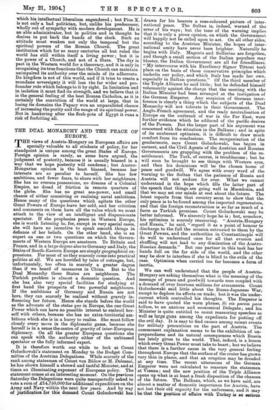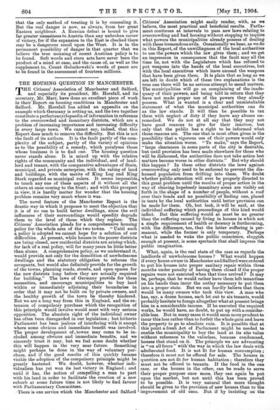EUROPE. T HE views of Austria-Hungary on European affairs are specially
valuable to all students of policy, for her standpoint is unique among the great States of Europe. Foreign opinion is rarely, as some have argued, the judgment of posterity, because it is usually biassed in a way that we hope posterity will condemn ; but Austro- Hungarian opinion is the least biassed, because her interests are so peculiar to herself. She has few ambitions, and fewer fears, to share with her neighbours. She has no oversea possessions, no dreams of a Colonial Empire, no dread of friction in remote quarters of the globe. She has no great sea-power, and small chance of either conceiving or realising naval ambitions. Hence many of the questions which agitate the other Great Powers of Europe leave her cold, and her criticism and comments on them have all the value which we must attach to the view of an intelligent and dispassionate spectator. If she prophesies peace in Western Europe, she is worth listening to, for, except in very special cases, she will have no incentive to speak smooth things in defiance of her beliefs. On the other hand, she is an expert on one or two questions on which the Govern- ments of Western Europe are amateurs. To Britain and France, and in a large degree also to Germany and Italy, the States of South-Eastern Europe are simply geographical ex- pressions. For most of us they scarcely come into practical politics at all. We are horrified by tales of outrages, but, unfortunately, too often in scarcely a greater degree than if we heard of massacres in China. But to the Dual Monarchy these States are neighbours. The Turkish problem is almost a domestic question. And she has also very special facilities for studying at first hand the prospects of two powerful neighbours. If the ambitions of Germany and Russia are not hers, they can scarcely be realised without gravely in- fluencing her future. Hence she stands before the world as the advocate of the status quo in Europe, the one Great Power which can have no possible interest to embroil her- self with others, because she has no extra-territorial am- bitions which she is in a hurry to realise. She must follow closely every move in the diplomatic game, because she herself is in a sense the centre of gravity of inter-European diplomacy. On all the greater European questions she can speak with the authority either of the unbiassed spectator or the fully informed expert.
It is therefore worth our while to look at Count Goluchowski's statement on Monday to the Budget Com- mittee of the Austrian Delegations. While scarcely of the rank among statesmen of Count von Billow or M. Delcasse, he has shown himself a shrewd and tactful Minister, and at times an illuminating exponent of European policy. The statement comes at an interesting moment. On the previous Saturday the Delegations were quite unexpectedly asked to vote a sum of £14,750,000 for additional expenditure on the Army and Navy within the next few years. And by way of justification for this demand Count Goluchowski has drawn for his hearers a rose-coloured picture of inter- national peace. The Sultan is, indeed, warned of the error of his ways ; but the tone of the warning implies that it is only a pious opinion, on which the Government will happily not be called upon to act. On all other sides, according to the Austrian Minister, the hopes of inter- national amity have never been brighter. Naturally he begins with Italy. Magenta and Solferino are forgotten, and though a small section of the Italian populace may bluster, the Italian Government are all for friendliness. "My intercourse with his Excellency Signor Tittoni took place on the basis of those conservative principles which underlie our policy, and which Italy has made her own, especially in Balkan questions." Of the third member of the Triple Alliance he said little ; but he defended himself vehemently against the charge that the meeting with the Italian Minister had been arranged at the instigation of the German Emperor. Any suspicion of German inter- ference is clearly a thing which the subjects of the Dual Monarchy will not tolerate in their Government. The Anglo-French agreement, and the ready neutralisation of Europe on the outbreak of war in the Far East, were further evidence which he adduced of the pacific desires of the Powers. But the larger part of his argument was concerned with the situation in the Balkans ; and in spite of its exuberant optimism, it is difficult to draw much comfort from its conclusions. The reorganisation of the gendarmerie, says Count Goluchowski, has begun in earnest, and the Civil Agents of the Austrian and Russian Governments are grappling with the problem of the re- settlement. The Turk, of course, is troublesome ; but he will soon be brought to see things with Western eyes, and then his dominions will be the chosen home of peace and goodwill. We agree with every word of the warning to the Sultan that the patience of Russia and Austria will not endure for ever. What we cannot understand is the hope which fills the latter part , of the speech that things are going well in Macedonia, and that we may set our minds at rest about the future. The latest reports from that country seem to show that the only peace is to be found among the imported regenerators, and that the foreign reconstruction is so far as much of a farce as Turkish promises. Count Goluchowski may be better informed. We sincerely hope he is ; but, somehow, his optimism is scarcely reassuring. "Austria-Hungary and Russia," he said, "regard it as a point of honour to discharge to the full the mission entrusted to them by the Great Powers, and the authorities in Constantinople will do well to understand once for all that evasion and shuffling will not lead to any diminution of the Austro- Russian demands." But one partner in this task has her hands full on the far side of the world, and the other may be slow to interfere if she is blind to the evils of the case. Optimism when carried too far becomes a form of inertia.
We can well understand that the people of Austria- Hungary are asking themselves what is the meaning of the message of peace and goodwill towards men coupled with a demand of over fourteen millions for armaments. Count Goluchowski said little about the Russo-Japanese War, except to deplore its effects on trade; but it was the under- current which controlled his thoughts. The Emperor is said to have quoted the worn phrase, Si via pacem para bellum, to an anxious and economical Delegate ; and his Minister is quite entitled to count reassuring speeches as well as large guns among the expedients for putting off the evil day. It is easy to find causes among recent events for military precautions on the part of Austria. The commonest explanation seems to be the exhibition of un- preparedness and its natural consequences which Russia has lately given to the world. That, indeed, is a lesson which every Great Power must take to heart ; but we believe that there is a further cause in the very general feeling throughout Europe that the surface of the crater has grown very thin in places, and that an eruption may be dreaded at any time. The recent utterances of the German Emperor were not calculated to reassure the statesmen at Vienna; and the new position of the Triple Alliance opens up what is at least a fresh disposition of the chances of the future. The Balkans, which, as we have said, are almost a matter of domestic importance for Austria, have not lost their old capacity for the unforeseen, and it may be that the position of affairs with Turkey is so serious that the only method of treating it is by concealing it. But the real danger is now, as always, from her great Eastern neighbour. A Russian defeat is bound to give far greater uneasiness to Austria than any unbroken career of victory, for if the expansion to the East is checked there may be a dangerous recoil upon the West. It is in the permanent possibility of danger in that quarter that we believe the true meaning of recent Austrian policy is to be found. Soft words and stern acts have never been the product of a mind at ease, and the cause of, as well as the supplement to, Count G-oluchowski's words of peace are to be found in the assessment of fourteen millions.



































 Previous page
Previous page